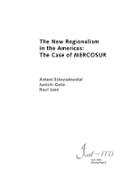The New Regionalism in the Americas: The Case of MERCOSUR
Date
Apr 2000
EDITOR
INTAL
This paper takes seriously the recent claim made by Ethier [1998] that the "New Regionalism" reflects the success of the multilateral trading system, not its failure. In fact, the New Regionalism represents a qualitative departure of the old regionalism in several respects, in particular, its development has taken place in a very different international economic environment. Moreover, the traditional Vinerian paradigm is no longer the primary analytical framework for its evaluation. We use this novel approach to analyze the case of one of the most important experiences in regional integration, the formation of the "Mercado Común del Sur" (MERCOSUR). The paper carefully documents the main stylized facts of the development of MERCOSUR arguing that this makes this type of agreement a prime example of the New Regionalism. Then, using a simple Krugman trade model with tariff distortions we show the positive welfare effects on member and non-member countries of these types of agreements. Our conclusions are consistent with Ethier's paper, that is, regionalism can play a key role in expanding and preserving the liberal trade order.



